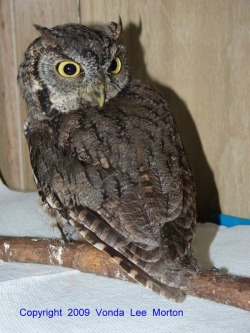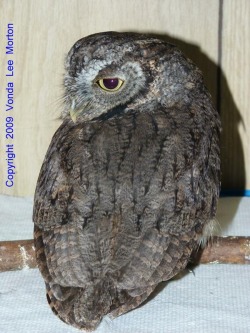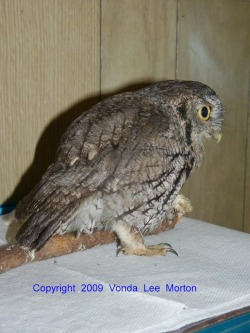Ah, yes, but you see, this little guy sent up all sorts of red flags. Where to begin? Well, let’s start with vet Peggy Hobby’s comment when I took him to Smalley’s Animal Hospital for an exam: she said he was awfully calm. (Actually, her exact words were along the lines of, “He’s not trying to take your face off, Vonda!”) I agreed, but we both attributed it to a concussion—the poor bird still had a massive headache from being sideswiped.

Next red flag, which practically slapped me in the face, it was waving so hard: when I was done feeding him, Young Screech began grooming my hand, very gently “nipping” at it with his beak. Again, granted that his beak is small, but it’s just as capable as those of his larger cousins of inflicting very painful injury. And he’s preening my hand…can you see where this is headed?
If not, let me spell it out for you: this owl is imprinted. Some fool apparently found him as a downy baby—or stole him from the nest; it’s not as uncommon a practice as you’d think—and tried to raise him as a pet. And as illegal as that is, it’s not even the worst of it. Through an improper diet, lack of visual stimuli as his eyesight developed, or prolonged exposure to bright lights while his eyes were developing--or a combination of these factors--Young Screech’s vision was impaired. Because owls have such excellent hearing, it’s hard to tell just how bad the damage to his eyesight is—is he turning toward me to look at me or because he hears my movement? We’re not sure.
He’s never had a chance to really fly. He’ll flutter from the feeding perch to the floor; he’ll stretch his wings and flap them on the perch—but fly? Spread those wings and sail in soundless, gorgeous owl flight? Nope. And the vision problems may be a contributing factor there; we’re not sure.
There’s more, like the fact that he’ll peck at the flat surface beneath his low perch like a chicken scratching for food when he drops meat, because he has difficulty seeing it, and the heartbreaking way he walks in circles, as if he’s never been in a space big enough to really move around, but what it all boils down to is that he’s horribly, horribly imprinted.

Oh, but the behavior I’ve been describing is precious, and he’s such a cute rascal! Yeah, I’ll be the first to admit that the cute factor shoots straight through the roof with a screech owl. As for his behavior, it would indeed be precious for a parrot or a parakeet, but not for a wild bird. For a wild bird, it signals doom, as an imprinted bird—any imprinted wildlife, for that matter—cannot be released back into the wild and by law must be euthanized or transferred to an educational facility. Those facilities are chock-full of animals with stories similar to Young Screech’s…

All this goes back to what I mentioned in the last update—as rehabbers, we all too frequently have to clean up other people’s messes. When that animal is fed a crappy diet for weeks or months before we get it; when it’s treated like a pet and allowed to mingle with domestic animals and humans; when it’s injured by improper handling, we’re the ones who get to try and straighten out what some idiot’s done…and all too often, we’re the ones who get to watch helplessly as that animal dies, despite our best efforts, or we get to make the decision to euthanize an animal that, had we gotten it in time, would have been treatable and releasable—or, most infuriating and heartbreaking of all, we have to euthanize a reasonably healthy animal whose imprinting makes him/her unreleasable.
Does this make me angry? No. It makes me homicidally infuriated, and even that doesn’t do justice to the depth of my feelings on the issue. Bottom line—as I’ve said repeatedly and will continue to shout from the proverbial rooftops, wildlife is best enjoyed in its natural habitat. If you find a wild baby, or even an injured adult, move the animal to safety, then minimize further human contact and CALL A REHABBER IMMEDIATELY!!!
 RSS Feed
RSS Feed
